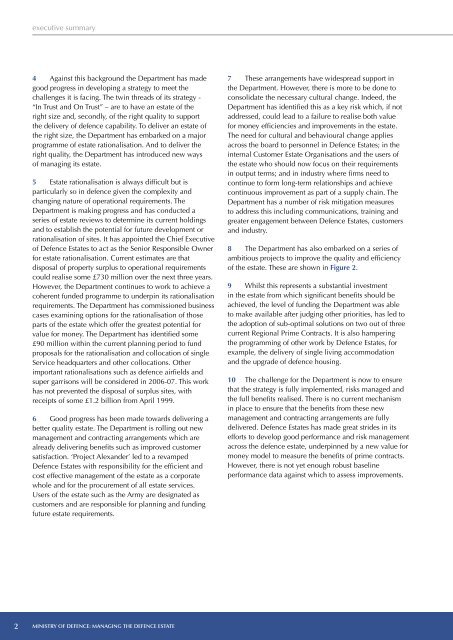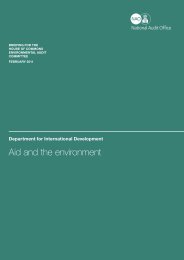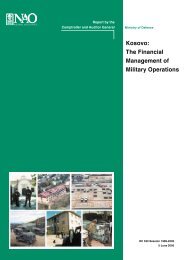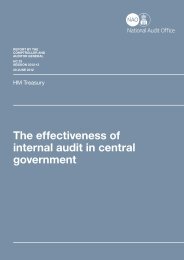Create successful ePaper yourself
Turn your PDF publications into a flip-book with our unique Google optimized e-Paper software.
executive summary4 Against this background the Department has madegood progress in developing a strategy to meet thechallenges it is facing. The twin threads of its strategy -“In Trust and On Trust” – are to have an estate of theright size and, secondly, of the right quality to supportthe delivery of defence capability. To deliver an estate ofthe right size, the Department has embarked on a majorprogramme of estate rationalisation. And to deliver theright quality, the Department has introduced new waysof managing its estate.5 Estate rationalisation is always difficult but isparticularly so in defence given the complexity andchanging nature of operational requirements. TheDepartment is making progress and has conducted aseries of estate reviews to determine its current holdingsand to establish the potential for future development orrationalisation of sites. It has appointed the Chief Executiveof Defence Estates to act as the Senior Responsible Ownerfor estate rationalisation. Current estimates are thatdisposal of property surplus to operational requirementscould realise some £730 million over the next three years.However, the Department continues to work to achieve acoherent funded programme to underpin its rationalisationrequirements. The Department has commissioned businesscases examining options for the rationalisation of thoseparts of the estate which offer the greatest potential forvalue for money. The Department has identified some£90 million within the current planning period to fundproposals for the rationalisation and collocation of singleService headquarters and other collocations. Otherimportant rationalisations such as defence airfields andsuper garrisons will be considered in 2006-07. This workhas not prevented the disposal of surplus sites, withreceipts of some £1.2 billion from April 1999.6 Good progress has been made towards delivering abetter quality estate. The Department is rolling out newmanagement and contracting arrangements which arealready delivering benefits such as improved customersatisfaction. ‘Project Alexander’ led to a revampedDefence Estates with responsibility for the efficient andcost effective management of the estate as a corporatewhole and for the procurement of all estate services.Users of the estate such as the Army are designated ascustomers and are responsible for planning and fundingfuture estate requirements.7 These arrangements have widespread support inthe Department. However, there is more to be done toconsolidate the necessary cultural change. Indeed, theDepartment has identified this as a key risk which, if notaddressed, could lead to a failure to realise both valuefor money efficiencies and improvements in the estate.The need for cultural and behavioural change appliesacross the board to personnel in Defence Estates; in theinternal Customer Estate Organisations and the users ofthe estate who should now focus on their requirementsin output terms; and in industry where firms need tocontinue to form long-term relationships and achievecontinuous improvement as part of a supply chain. TheDepartment has a number of risk mitigation measuresto address this including communications, training andgreater engagement between Defence Estates, customersand industry.8 The Department has also embarked on a series ofambitious projects to improve the quality and efficiencyof the estate. These are shown in Figure 2.9 Whilst this represents a substantial investmentin the estate from which significant benefits should beachieved, the level of funding the Department was ableto make available after judging other priorities, has led tothe adoption of sub-optimal solutions on two out of threecurrent Regional Prime Contracts. It is also hamperingthe programming of other work by Defence Estates, forexample, the delivery of single living accommodationand the upgrade of defence housing.10 The challenge for the Department is now to ensurethat the strategy is fully implemented, risks managed andthe full benefits realised. There is no current mechanismin place to ensure that the benefits from these newmanagement and contracting arrangements are fullydelivered. Defence Estates has made great strides in itsefforts to develop good performance and risk managementacross the defence estate, underpinned by a new value formoney model to measure the benefits of prime contracts.However, there is not yet enough robust baselineperformance data against which to assess improvements.2MINISTRY OF DEFENCE: MANAGING THE DEFENCE ESTATE
















